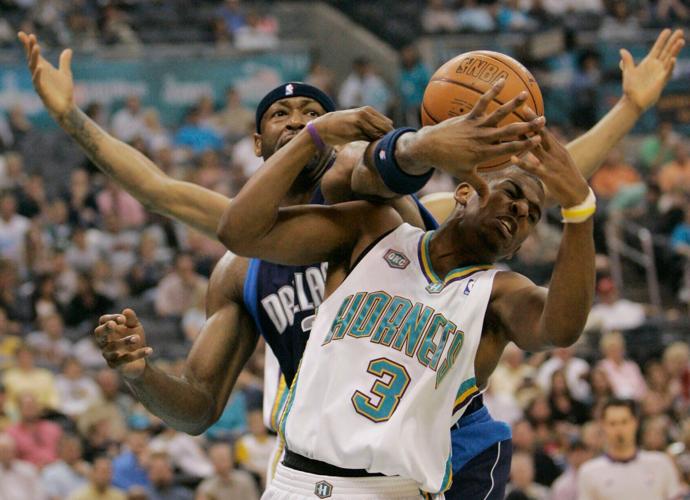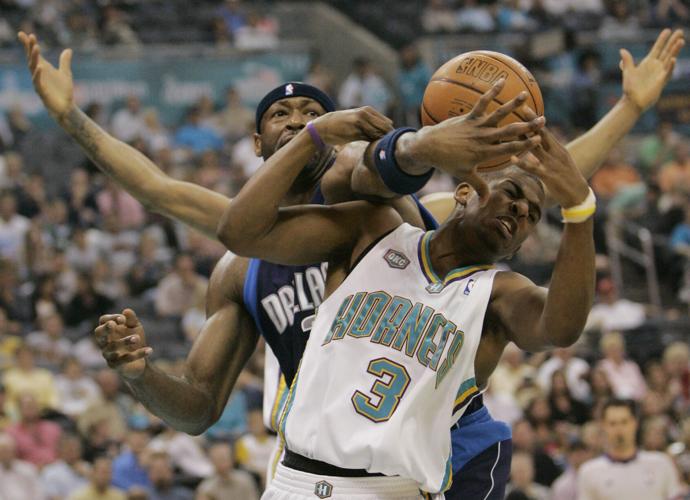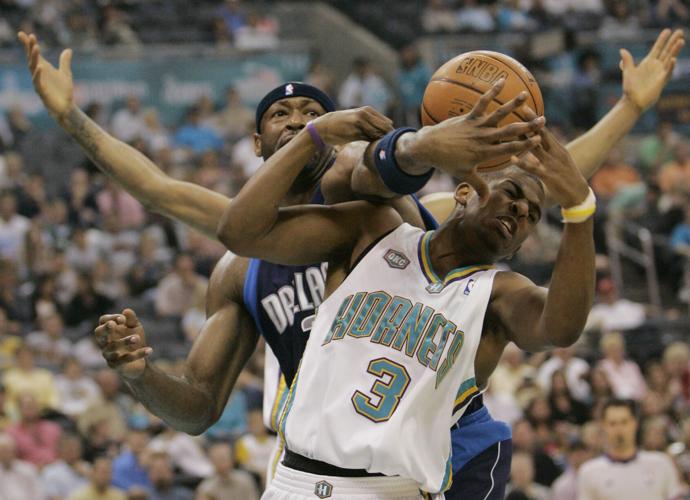In the fall of 2005, Jim Eichenhofer loaded up his Nissan Sentra and made the three-day drive from upstate New York to Oklahoma.
Eichenhofer, a sports writer who covered Syracuse and high school sports for the Finger Lakes Times, badly wanted to break into NBA media. He got his chance when he landed a job with the New Orleans Hornets as one of the team’s in-house reporters.
The Hornets decided to temporarily relocate to Oklahoma City in the aftermath of Hurricane Katrina. For the next two years, Eichenhofer lived at Crimson Park, an apartment complex in nearby Norman, Oklahoma. Eichenhofer estimated he was one of the 80 Hornets employees who settled there. All of them understood it was a temporary arrangement, but in their time at Crimson Park, the bond among the mishmash unit of Louisianans, Oklahomans and others who worked for the team grew strong.
“That apartment complex got complaints from the college students sometimes about the Hornets employees being too loud,” Eichenhofer said. “That always cracked me up. It was the opposite of what you’d expect.”
The way Oklahoma City embraced the Hornets paved the way for the market to land the Thunder in 2008. Sixteen years later, the Thunder and the Pelicans (the Hornets were rebranded as the Pelicans in 2013) are locked in their first-ever playoff series against each other.
Eichenhofer is one of the handful of employees who has remained with New Orleans’ NBA franchise since those uncertain days in Oklahoma City.
“I thought it was pretty incredible the way that they embraced just having an NBA team and being in that situation," Eichenhofer said. "For people in Oklahoma City, it was kind of like when you get a gift you don’t expect. You’re very gracious about it. It was something where people there, I don’t think they even saw as a possibility.”
In their sixth home game at Ford Center in Oklahoma City, the Hornets faced the Minnesota Timberwolves. The Hornets fell behind by 18 points in the second quarter, but the 19,163 in attendance remained raucous in their support. The Hornets stormed back to beat the Kevin Garnett-led Timberwolves 84-80. Power forward David West made a pair of free throws with three seconds left to seal the win.
That night was proof that professional basketball could work in Oklahoma City for many who were in the building.
“I was like, ‘What is going on?' " said Josh Richardson, who oversaw the Hornets' game-day production. "They know basketball. They are invested in basketball. At that moment, I was like, ‘This is an NBA city.' You can just see it."
Richardson and his wife, who worked in the Hornets’ marketing department, had gotten married in July 2005. They returned from their honeymoon and then had to evacuate Louisiana before Katrina made landfall. They worked out of Houston for two weeks. Then, the Hornets decamped to Oklahoma.
The Richardsons didn’t get to open their wedding gifts until they returned to Louisiana for good in 2007. All of their presents sat in a storage unit for two years.
“I don’t think you can ever imagine what we all went through,” Richardson said. “Everyone had a story following Katrina. Everyone. We all just kind of came together and embraced it.”
Crimson Park was a new apartment complex with sparkling amenities. There was a basketball court, which got a lot of traffic. Eichenhofer remembered there often being a wait to play in 5-on-5 games.
Crimson Park also had an in-ground pool. More than once, Eichenhofer walked by and saw beer cans floating in it.
“Because there were so many people from other parts of the country as well as Louisiana, everybody was kind of in the same boat as far as, ‘This is a brand-new area none of us know anything about,' " Eichenhofer said. “That part made it fun because you would develop friends with people you worked with. We definitely spent a ton of time together.”
During the 2005-06 season, the Hornets played home games in four different cities. The vast majority (36 games) happened inside the Ford Center in Oklahoma City. There were three games in New Orleans, one in Baton Rouge and one in Norman, Oklahoma.
Richardson was responsible for producing the games in all of those markets. That meant different mascots, dance teams and other personnel at every stop.
“Doing two completely different shows for two completely different audiences,” said Richardson, who is now the executive producer of live programming and broadcasting for the Pelicans. “We flew back and forth. It was bizarre.
"But on a personal note, I think that’s what carried me here. To my position today. Just learning so much.”
The Hornets finally got to return home for the 2007-08 season. That year, a young point guard named Chris Paul led the team to a 56-26 record. The Hornets earned the West's No. 2 seed and advanced to the second round of the playoffs.
On April 18, 2008 — the day before the Hornets’ first-round series against the Dallas Mavericks tipped off — the NBA’s board of governors approved a bid to relocate the team that was in Seattle to Oklahoma City in a 28-2 vote.
“The city embraced us,” Richardson said. “I think it showed Oklahoma City deserved a team.”



